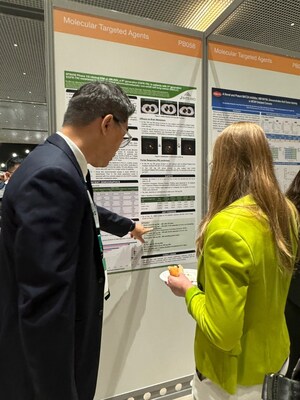J INTS BIO Presents Interim Findings from Phase 1/2 Clinical Trial of 4th-Generation EGFR-TKI 'JIN-A02' in NSCLC: A Potential Breakthrough in Overcoming Acquired Resistance to Targeted Therapy
Comunicato Precedente

Comunicato Successivo

Mutations in the epidermal growth factor receptor (EGFR) is a key driver in the pathogenesis of NSCLC, with 3rd Generation EGFR-TKIs like osimertinib serving as the cornerstone of treatment. Unfortunately, eventually resistance to this treatment will occur, leading to cancer relapse and disease progression. JIN-A02, developed by J INTS BIO, is the 4th-generation EGFR-TKI specifically designed to address this. By targeting both the original mutations and those acquired subsequently as a result of cancer treatments, it offers a therapeutic solution for these patients.
The ongoing Phase 1/2 clinical trial evaluates JIN-A02 in patients with advanced or metastatic NSCLC who have developed resistance and disease progression after 3rd-generation EGFR-TKIs use. The study consist of 3 parts: dose escalation (Part A), dose exploration (Part B), and dose expansion (Part C). The data generated so far in Part A has been encouraging with a good safety profile and early efficacy signals, underscoring JIN-A02's position as a novel treatment for EGFR-TKI-resistant NSCLC.
J INTS BIO said, "New treatment are urgently needed for lung cancer patients whose disease has worsened or relapsed after treatment with 3rd-generation EGFR-TKI. JIN-A02 is potentially one such treatment option that can bring hope to patients world wide."
Study Design and Interim Results:
To date, the Part A of the study has enrolled 16 patients who received increasing doses of JIN-A02, starting with a low dose of 12.5mg daily to 150 mg daily, with the primary objective of determining the maximum tolerated dose (MTD). This Part also look at safety, pharmacokinetics, and anti-tumor activity as secondary objectives. Doses higher than 150mg are currently being studied in this Part.
Key Interim Findings:
Progression to Subsequent Trial Phases:
Once we have the final doses to be used in Phase 2, the dose-expansion part of the study (Part B) will begin, and two doses will be selected and studied in bigger groups of patient to verify its safety, pharmacokinetics, and anti-tumor activity. Part B is essential for the selection of the final dose level to be used in Phase 2 or Part C of this study.

In this final part (Part C), we will investigate JIN-A02 in specific patient populations who are stratified by EGFR mutation subtypes and the presence of CNS metastases. Part C is critical for generating a bigger dataset on the drug's therapeutic potential across distinct NSCLC patient groups for regulatory approval purposes.
Implications for Future Therapeutic Development
Professor Byeong Cheol Cho of Severance Hospital's Division of Medical Oncology, South Korea, commented on the significance of these findings, stating, "JIN-A02's demonstrated efficacy against both lung and its associated CNS disease underscores its potential as a groundbreaking treatment for patients with EGFR-TKI-resistant NSCLC, including and especially those with brain metastases."
JIN-A02's ability to effectively target CNS lesions represents a notable advancement and as a 4th generation EGFR-TKI, offers hope for patients with very limited options as a result of progression after 3rd-generation TKIs use.
Next Steps in Clinical Development:
J INTS BIO is fully committed to accelerating the clinical development of JIN-A02. And as the clinical study continues to enroll patients ahead of schedule, JIN-A02, is poised to shape the treatment landscape of NSCLC and to offer hope to lung cancer patients worldwide.





